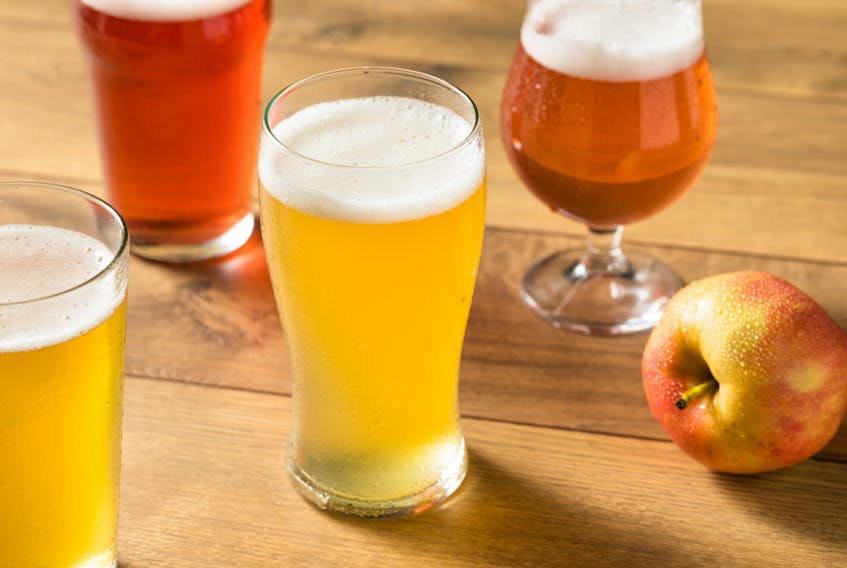The Federal Court of Appeal has ruled on what can and can’t be considered Canadian-made wine, at least for tax purposes.
The court dismissed the government’s appeal of a prior tax court ruling, sparing a B.C. cider-maker roughly $2 million in duties. The ruling means the the cider still qualifies for a made-in-Canada exemption even though it added some concentrated apple juice made from foreign apples.
To come to that conclusion, Federal Court of Appeal Justice Wyman W. Webb embarked on a deep and complicated discussion of when wine becomes wine.
“It’s fascinating,” University of Toronto law professor Benjamin Alarie said of Webb’s 18-page decision.
First, Webb establishes that the cider in question — Okanagan Premium Cider and Extra Hard Cider, produced by the Mark Anthony Group — is wine. Mark Anthony crushes and ferments Canadian-grown apples. That meets the Excise Act’s definition of wine, which includes any alcoholic beverage made from fermenting plants (other than grains).
“The cider in issue is in this appeal is wine,” Webb wrote in his June decision, which the court published online Tuesday.
The Excise Act imposes duties on alcohol, but allows an exception for Canadian-made wine. But the CRA argued Mark Anthony’s cider didn’t qualify for the exemption because Mark Anthony added foreign-sourced apple juice concentrate before packaging the liquid. Also, in a small portion of the cider, Mark Anthony fortified its cider using foreign spirits.
A central question, for Webb, was when to test a wine’s Canadian-ness. The CRA argued that the test should occur at the time a wine is packaged. At that point, the wine in question would include non-Canadian apple juice concentrate and therefore is not Canadian.
But Webb looked to the text of the exemption, which refers to wine “produced in Canada and composed wholly of agricultural or plant product produced in Canada.”
He paid special attention to the word “produced.”
“Wine is produced when it is brought into existence by fermentation,” he wrote, quoting a definition in the Excise Act.
“Therefore, in my view, the test for wine that comes into existence by fermentation is to be applied at the time that the agricultural or plant products are fermented,” Webb wrote, echoing with the Tax Court judge who ruled in favour of Mark Anthony in 2017.
The Tax Court judge was particularly interested in the water added to Mark Anthony’s cider. Water is a main ingredient in the packaged cider. But water isn’t a plant grown in Canada. If the test occurs at fermentation, the exemption still stands. But if the test occurs at packaging, the cider would be automatically disqualified from the exemption. In fact, many wines would be disqualified, if tested on their ingredients in packaging — defeating the exemption’s purpose of supporting Canadian vintners and farmers, the judge found.
“If no product could satisfy the exemption, it would not support Canadian vintners or farmers,” Webb wrote.
But then, Webb brought a twist. Sugar and yeast is often added to aid the fermentation process, he said, quoting expert evidence. And it’s near impossible to source sugar entirely produced in Canada, Webb found. So if the Tax Court judge was right, and the Canadian-ness test was to be applied at the time of fermentation, then many wines could fail.
He noted the CRA had instituted its own internal guidance, allowing “incidental” ingredients like sugar and yeast to be sourced outside of Canada. But giving the CRA the power to decide which ingredients are incidental was a “delegation of authority” unintended by Parliament, Webb said.
“It may be appropriate for Parliament to review the wording of this exemption to ensure that it will actually work and provide the intended exemption,” Webb wrote.
But in denying the appeal, Webb ignored the issue of foreign ingredients in the fermentation process, since neither the Crown nor the tax judge brought them up.
The main issue was the juice concentrate and spirits added to the cider afterwards.
That led Webb to another wrinkle. Mark Anthony’s cider blended fermented apple juice with distilled spirits. So it is fortified wine, and fortified wine does not technically meet the Excise Act’s definition of wine, “as it does not come into existence by the fermentation of an agricultural or plant product,” Webb said. “It comes into existence by the blending of a fermented product with a distilled product.”
In that case, the test should apply to each alcoholic component: The fermented component should use Canadian-grown products in the fermentation; and the distilled produced should use Canadian-grown products in the distillation.
That means that Mark Anthony’s small portion of cider fortified with foreign spirits wouldn’t technically qualify — a tax that Mark Anthony calculated at approximately roughly $40,000. But the tax court judge had already reduced the tax reassessment to reflect the foreign spirits.
Webb dismissed the government’s appeal.
“We’re pleased with the results of the decision,” Mark Anthony spokesman Ian Galbraith said in an email.
• Email: [email protected] | Twitter: jakeedmiston
Copyright Postmedia Network Inc., 2019









